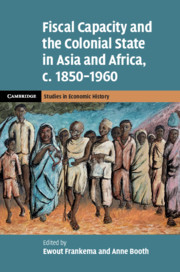Fiscal Capacity and the Colonial State in Asia and Africa, c.1850–1960 Cambridge Studies in Economic History - Second Series
Coordonnateurs : Frankema Ewout, Booth Anne

Anne Booth is Professor Emerita at School of Oriental and African Studies, University of London. She has researched on the economies of Southeast Asia in both the colonial and post-colonial eras, and has written and edited a number of books on the region as well as articles in journals.
Date de parution : 09-2022
Ouvrage de 319 p.
15.2x22.9 cm
Disponible chez l'éditeur (délai d'approvisionnement : 14 jours).
Prix indicatif 30,28 €
Ajouter au panierDate de parution : 12-2019
Ouvrage de 242 p.
15.9x23.5 cm
Disponible chez l'éditeur (délai d'approvisionnement : 14 jours).
Prix indicatif 107,80 €
Ajouter au panier


